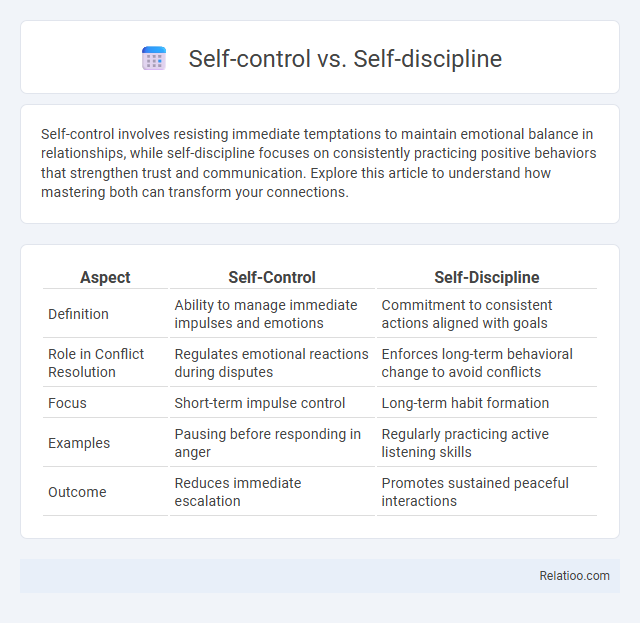Self-control involves resisting immediate temptations to maintain emotional balance in relationships, while self-discipline focuses on consistently practicing positive behaviors that strengthen trust and communication. Explore this article to understand how mastering both can transform your connections.
Table of Comparison
| Aspect | Self-Control | Self-Discipline |
|---|---|---|
| Definition | Ability to manage immediate impulses and emotions | Commitment to consistent actions aligned with goals |
| Role in Conflict Resolution | Regulates emotional reactions during disputes | Enforces long-term behavioral change to avoid conflicts |
| Focus | Short-term impulse control | Long-term habit formation |
| Examples | Pausing before responding in anger | Regularly practicing active listening skills |
| Outcome | Reduces immediate escalation | Promotes sustained peaceful interactions |
Understanding Self-Control: Definition and Key Concepts
Self-control is the ability to regulate your emotions, thoughts, and behaviors in the face of temptations and impulses, making it essential for achieving long-term goals. It differs from self-discipline, which involves creating structured habits and routines to maintain consistent effort over time, while self-regulation encompasses broader strategies to manage stress and motivation. Understanding self-control means recognizing its role in impulse management, emotional regulation, and decision-making processes to enhance personal growth and goal attainment.
What is Self-Discipline? Core Principles Explained
Self-discipline is the practice of training oneself to consistently follow rules, procedures, or a set of goals despite temptations or distractions. Core principles include commitment, perseverance, and delayed gratification, which enable individuals to maintain focus and achieve long-term success. Unlike self-control, which often relates to momentary restraint, self-discipline involves sustained effort and strategic planning to build lasting habits.
Self-Control vs Self-Discipline: Fundamental Differences
Self-control refers to the ability to resist immediate temptations and impulses, while self-discipline involves the consistent application of rules and habits to achieve long-term goals. Your self-control is often momentary and reactive, helping you avoid short-term distractions, whereas self-discipline is proactive and sustained, structuring your behavior over time. Understanding these fundamental differences can help you develop strategies that enhance both, leading to improved personal and professional outcomes.
The Psychological Roots of Self-Control and Self-Discipline
The psychological roots of self-control and self-discipline lie in executive functions governed by the prefrontal cortex, which manage impulse regulation and goal-directed behavior. Self-control enables You to resist immediate temptations, while self-discipline involves consistent effort and routine adherence over time. Both skills are fundamentally shaped by cognitive processes such as attention, working memory, and emotional regulation, which blend to optimize decision-making and long-term success.
Real-Life Examples: Self-Control in Action
Self-control is the ability to resist immediate temptations, such as avoiding junk food despite cravings, while self-discipline involves consistent long-term habits like maintaining a daily exercise routine. Real-life examples of self-control in action include delaying gratification to save money, resisting distractions at work, or staying calm in stressful situations. Both self-control and self-discipline contribute to personal success by regulating behavior and fostering goal achievement.
Practical Scenarios: Applying Self-Discipline Daily
Self-discipline involves consistently applying control over your actions to achieve long-term goals, unlike self-control which temporarily restrains impulses and self-focus which maintains attention on a task. Practical scenarios such as adhering to a workout schedule, managing time effectively at work, and resisting unhealthy food cravings highlight the importance of self-discipline in daily life. Cultivating your self-discipline ensures sustained effort and success across various personal and professional challenges.
Benefits of Developing Both Self-Control and Self-Discipline
Developing both self-control and self-discipline enhances your ability to resist short-term temptations while maintaining consistent long-term goals, leading to improved mental clarity and emotional stability. Self-control helps manage immediate impulses, whereas self-discipline fosters persistence and structured habits, maximizing productivity and overall well-being. Cultivating these traits together supports better decision-making, stronger willpower, and greater success in personal and professional life.
Challenges and Common Misconceptions
Self-control often faces challenges such as emotional triggers and stress, while self-discipline struggles with consistency and long-term commitment, both frequently misunderstood as synonymous concepts. Common misconceptions include equating self-control merely with resisting temptation and underestimating the role of structured habits and goal-setting central to self-discipline. Understanding these distinctions is crucial for developing effective strategies that address the unique psychological and behavioral obstacles tied to each attribute.
Strategies to Strengthen Self-Control and Self-Discipline
Self-control and self-discipline are essential for personal growth, with self-control involving resisting immediate temptations and self-discipline focusing on long-term goal commitment. Strategies to strengthen these traits include setting clear, achievable goals, practicing mindfulness to boost awareness of impulses, and creating routines that reinforce positive habits. By incorporating consistent effort and tracking progress, you can enhance your ability to maintain focus and make disciplined choices that align with your aspirations.
Building a Balanced Approach: Integrating Both for Success
Balancing self-control and self-discipline enhances your ability to achieve long-term goals by managing impulses and maintaining consistent effort. Self-control helps you resist immediate temptations, while self-discipline fosters perseverance and routine, creating a synergistic effect for productivity. Integrating both ensures a sustainable approach to success, improving focus and resilience in the face of challenges.

Infographic: Self-control vs Self-discipline
 relatioo.com
relatioo.com